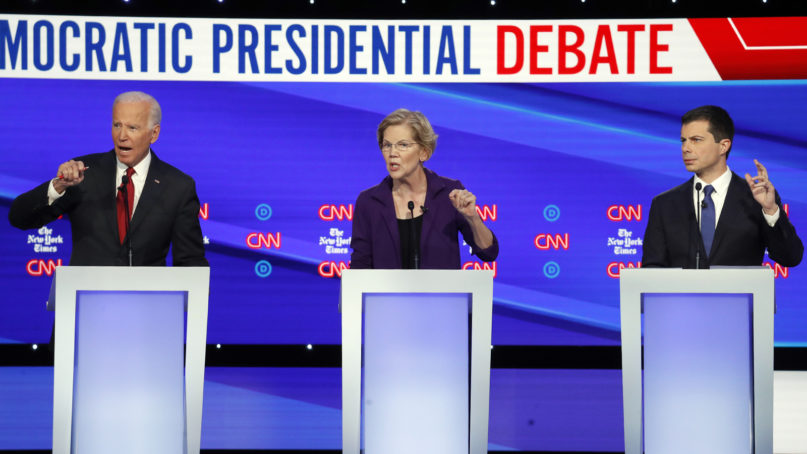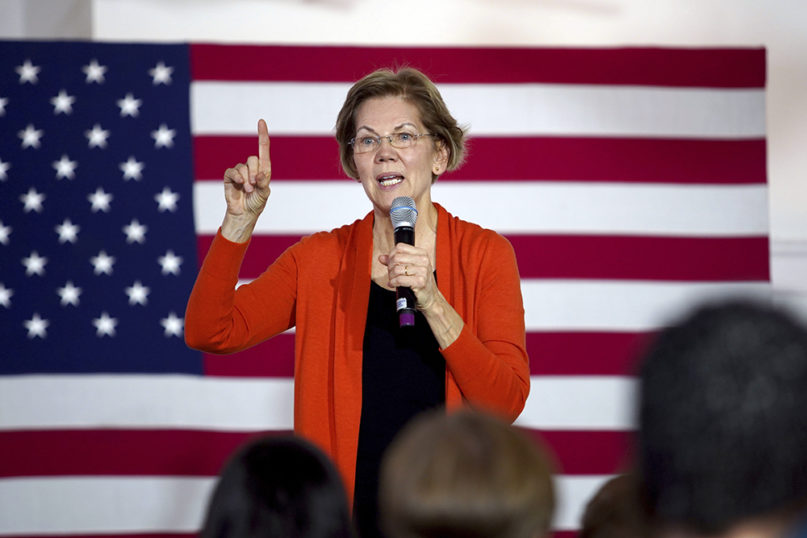(RNS) — On a recent Monday night in Iowa City, Sen. Elizabeth Warren was asked at a town hall if she had a plan “for protecting the rights of atheists and other non-believers.”
The Democratic presidential candidate who frequently boasts about having “a plan for that” sidestepped the question entirely.
While briefly acknowledging laws protecting freedom of religion, including the right not to worship at all, Warren didn’t explain how her candidacy would protect non-religious Americans. It wasn’t even clear that she knew what our concerns were.
Warren is hardly alone in failing to articulate what her presidency would do specifically for the ever-growing number of non-religious Americans. But considering that roughly a third of Democratic voters are not affiliated with any organized religion, this is a major gap in the platforms of not only Warren but all the major Democratic presidential candidates, even among those who have hired religious outreach directors.
A better response from Warren would have mentioned at least a few major issues that affect our community. While these are by no means the only matters of concern for us, taking them seriously would show some respect to what is rapidly becoming the largest “religious” group in the country. Importantly, doing so would not deprive religious citizens of their voice, much less their rights.
Here are some of the most pressing requests on the minds of non-religious Americans:
Make sure taxpayers aren’t funding religious dogma. Presidents from both parties have allowed federal money to go to faith-based groups that discriminate in hiring. The current administration has gone beyond that, pushing the idea that religious institutions themselves deserve to be rewarded with taxpayer money — and promoting federal judges who hold that belief.
Consider how the current administration is dealing with a major church/state separation case that will soon be in front of the Supreme Court. Espinoza v. Montana Department of Revenue involves a scholarship program that gave a tax credit to Montanans who donated to private religious schools, which the Montana Supreme Court said last year was unconstitutional.
The administration is now urging the U.S. Supreme Court to overturn that ruling. A coalition of four atheist groups has argued in an amicus brief that the government’s position undermines religious freedom of all by giving private, faith-based schools a benefit they shouldn’t receive.
The government has also argued — and won — a case that said a large Christian cross maintained on public property was not a violation of the Establishment Clause.
It will be the next Democratic president’s job to make sure public needs aren’t paying for religious wants. That president should also pledge to only nominate judges who respect the wall of separation between church and state.

Democratic presidential candidates former Vice President Joe Biden, left, Sen. Elizabeth Warren, D-Mass., center and South Bend Mayor Pete Buttigieg speak during a Democratic presidential primary debate hosted by CNN/New York Times at Otterbein University, Tuesday, Oct. 15, 2019, in Westerville, Ohio. (AP Photo/John Minchillo)
Push back against Christian nationalism. Trump has actively promoted the idea, through the Christian pastors he surrounds himself with and the executive orders he has issued, that being an American and being religious are synonymous. While restricting refugees and limiting the number of legal immigrants into the country, Trump has said he would do more for Christians trying to come here. Even the U.S. State Department has promoted a speech given by Secretary Mike Pompeo titled “Being a Christian Leader.”
This administration has “weaponized religious freedom, in the way they talk about values, and in the way they approach patriotism and Americanness,” says American Atheists President Nick Fish.
Make sure secular Americans have a seat at the table. The eventual Democratic nominee should hire a “secular outreach director” to go with the religious outreach person, whose job it is to connect the candidate’s policies with communities that revolve around faith. (Warren has been asked about this specifically and said she would consider it.)
If the next president continues to have any sort of faith-based advisory board, as Obama had and Trump has maintained, then non-religious Americans should be included in the mix. No “interfaith” group is complete if it excludes non-religious voices. Just because we don’t believe in a god doesn’t mean we don’t have opinions on matters concerning religion and the government.
Stop the unnecessary god talk. The president should omit references to any god when giving speeches or taking an oath, or at least take time to acknowledge that tens of millions of Americans don’t believe in any kind of higher power.
The next Democratic president should consider it his or her job to remind the country that abstaining from organized religion is neither un-patriotic nor un-American. Freedom From Religion Foundation attorney Andrew Seidel put it bluntly: “Patriotism has no religion.”
There’s an argument to be made that suggesting any benefits for atheists could alienate religious voters, therefore it’s better to avoid the issue entirely.
Atheists and other groups focused on separation of church and state are not making any requests that would put religious Americans at a disadvantage. We want the government to treat us just as it treats them. We want the government to stop playing favorites when it comes to religion.
That’s not just a personal request. It’s what the Constitution demands.





